Filed under: Journey Updates | Tags: Afghanistan Obama’s Vietnam, 2009 Nobel Prize Winner President Obama, civilian versus military surge in Afghanistan, McChrystal’s Afghan assessment, Obama and Ghandi, Obama and Martin Luther King, Obama’s Afghan strategy, peace in Afghanistan, war in Afghanistan
Please watch a young, Afghan friend talk about our savage ‘Afghan’ instincts
http://www.youtube.com/watch?v=XI9pGYP1Eiw
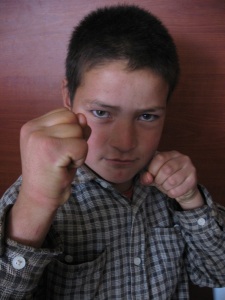
“They are like ‘animals’ because they are unethical & get furious.”
From my peaceful mud-house in the Afghan Hindu Kush hills, I imagine a White House morning when Malia and Shasha are sincerely worried and fearful about some dangerous rumours, that inhuman extremists in Hamburg, Yemen, Somalia, Afg/Pak and closer to home, in New York, may be plotting to hurt them and their friends.
I can’t imagine their kind, loving father Obama storming into their room and shouting, “Don’t worry, I will send 40,000 more troops to every one of those places, I’ll escalate the number of Nevada-based computer-drone pilots who would remotely extinguish your distant fears, and if you have any strong suspicions about any fishy characters near you, I will activate our modified renditions, trace down and destroy all their safe havens or simply, I’ll kill them all.”
I can’t imagine it because behind Obama’s desk in his Senate office, there are 2 iconic pictures on the wall, of heroes close to Obama’s heart : Ghandi and Martin Luther King. They would speak to Obama in their deaths if they could. What they would have said today they had said years ago; and I’ve reproduced their clear strategy below for Obama’s convenience.
I can’t imagine this of a Nobel Peace Prize Laureate. We congratulate him for being conferred this title.
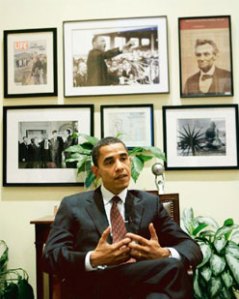
If hate is the root of the ‘terror’ around and within us, we clearly need a civil response of courageous love.
We need to bravely re-define what is of ‘necessity’; our conscience and even our fears recognize that what is of ‘necessity’ now is not war.
We cannot make ourselves more secure with more violence. We cannot gain trust with more mutual killing. We never win by imposing death on others or on our own soldiers.
Even if we, somehow, ‘win’, we ourselves, eventually, die. We all do, not just Afghans.
President Obama, ordinary Afghans and international soldiers who are dying in what is now your Afghan war, ask that you do not inadvertently re-define peace as war, for in so doing, you would have taken away all of our hope.
Though I can’t think this mad-ness of America’s First Family, the world is staring at the angry, arrogant illogic of our 21st century’s insecure, First World elite policy makers.
With them, there are no longer any creative, non-violent, civilian alternatives. Very few thinkers think. Hardly any empathize and philosophy is derisively dead.
So, when Gore Vidal said that there’ll be a ‘dictatorship’ in the US soon, or when Jimmy Carter suggested a deep racist undercurrent to health care reform or when the Pope had called the kettle black in blaming greed for the financial crisis, they are partly referring to the complete dominance of the haughty, savage instinct of SELF-preservation over all else. And this isn’t a uniquely savage ‘Afghan’ instinct. It’s in all of us.
No questions.
No alternatives.
Questions and alternatives are deemed treason.
The only ‘winnable’ military strategy becomes sacred and ‘holier-than-thou’, because we believe that we must have ‘victory’ at all cost. We fear ‘losing’, even if we lose everything ‘essential about ourselves’.
Afghans know this strategy very well. They have been dying from the dictatorship of their ancient, violent greed for power and money. Now, we are sealing their greed and our deaths with Man’s hollow appearances and foggy wars. We are declaring:
Fraud is free.
Lies are truths.
Military might is right.
And money is everything.
Afghanistan’s tribal warlordism used to be confined to villages and valleys but now, with international assistance, it has been sanctioned and propagated country-wide. So, Afghans who have lived all their lives surviving and mastering this primitive warlordism are waiting, hungrily waiting.
“Train us! Send us those dollars! We’ll help you through our endlessly vengeful, constantly traitorous shifting allegiances. Don’t worry about us; on the average, we live for only 43 years anyway,” the Afghan elite shout.
Living here in a tribal village in Afghanistan, I’ve come to understand our common human condition. I’m not talking about the breakout of the ‘Lord of the Flies’ style savagery on William Golding’s island or at Kabul’s US fortress or in the desperate, fraudulent Afghan elections.
I’m talking about something much, much cruder.
This madness needs to stop. We need to find love and truth again.
Afghans have not seen compassion or justice in the inhumanity of constant war. They need hope that the abusive money and power of the corporate 1% do not always triumph. Every human needs such hope.
Maybe, they and the world can discover these human values if Obama remains engaged in Afghanistan, but through a 90% civilian effort. We can all be more imaginative in our commitment.
Those who reason that the military strategy must precede the civilian surge should consider the view of Amrullah Saleh, the head of the Afghan intelligence agency, when he said that the Pakistani intelligence service, the ISI, could play a vital role in ending the Afghan war. “To arrest the Taliban leadership in Quetta, you don’t need a military operation … just soft-knock their house and arrest them,” Saleh told Al Jazeera. Or I ask myself how some international humanitarian civilians and I could live in Quetta post-September 11, without hired security.
We wish for a 90% civilian approach because we envision that robust international relations are fostered through sincere diplomacy, not armed threats and we expect that Obama’s government is ultimately a civilian government, not a military one.
The authority of the Commander-in-Chief was not intended to approve militarism as a way of good governance but as a check, lest we forget that we are firstly humans, and that our naked humanity needs to be our primary resort, way before partisan politics and uniformed plans.
And since weighing the financial cost-benefit of waging war would remorselessly favor fighting for an illusory national security and recycling the tangible military-industrial profit, we’re unlikely to find sanity that way. It’s time, instead, to humanely deliberate over the priceless human cost behind every soldier, veteran and civilian dying, for what?
Obama is heading towards real Change in re-considering the Afghan strategy anew, for the sake of ourselves and our fellow human beings, because re-considering is a key to humanity’s innovation, if not a way to recover our kindness. We are trusting in the kindred spirit overcoming man-made institutions and temporal decorum when we keep hope that the debate would truly be diverse and not merely cosmetic.
No human likes abandonment, as is natural in normal friendships, so while some rightly fear that creating all the civilian options we can muster to assist Afghanistan may be misconstrued as leaving Afghanistan, those fears are unfounded and unfriendly.
Einstein’s pacifist intellect is sorely needed but his common sense intellect is sufficiently important at this moment: “We cannot solve our problems with the same thinking we used when we created them. We shall require a substantially new manner of thinking if mankind is to survive.”
Obama’s penchant for history knows that war certainly isn’t new. War is the same old, tragic story. It will never be the ‘substantially new manner of thinking’ required for our survival, for our freedom from fear and our search for meaning.
President Obama, please reason with the civil hearts among the masses, whose majority want peace, through a referendum if necessary. You will then witness the very virtue you want your iconic heroes to remind you of, that ‘real results will not just come from Washington, they will come from the people’, that a truer ‘governance of the people by the people’ built upon the moral compass of ordinary people is possible in the States, and with great patience, in Afghanistan too. After all, whether we live life with a conferred title, rank or uniform, or as name-less souls, we all perish as ordinary people.
And please heed the civil voices, even if they come from the dead, silent wall behind you.
For then, the escalating anger and madness, our shared savage instincts, would begin to abate. And our world would find genuine safety in decency and in the conciliatory civilizations of this age, the momentous change we’ve all been longing for.
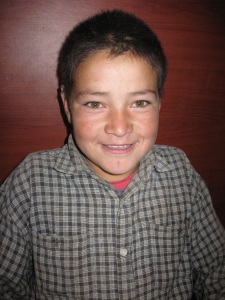 the bright, civil Afghan
the bright, civil Afghan
Ghandi and Martin Luther King to Obama today
Below are the 2 icons speaking to Obama. I have not bothered to change the names of the countries mentioned because the love and truth spoken in their views don’t change, not for the well-known Presidents that pass through the White House, or for the unknown Afghans that live in the hills.
And enough similarities have been drawn about the Afghan and Vietnam war scenarios, though such analyses can never bring back those who have been killed in the past, nor clarify the doubts of those who choose to kill today, nor alleviate the terror of those who may be killed.
Ghandi to Obama today
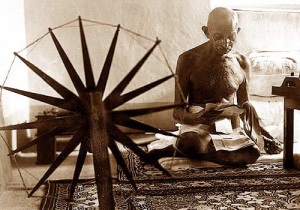
Ghandi
I may not carry my argument any further. Language at best is but a poor vehicle for expressing one’s thoughts in full. For me nonviolence is not a mere philosophical principle. It is the rule and the breath of my life. I know I fail often, sometimes consciously, more often unconsciously. It is a matter not of the intellect but of the heart. True guidance comes by constant waiting upon God, by utmost humility, Self-abnegation, by being ever ready to sacrifice one’s self. Its practice requires fearlessness and courage of the highest order. I am painfully aware of my failings.
But the Light within me is steady and clear. There is no escape for any of us save through truth and non-violence. I know that war is wrong, is an unmitigated evil. I know too that it has got to go. I firmly believe that freedom won through bloodshed or fraud is no freedom.
The end and aim of the movement for British withdrawal is to prepare India, by making her free for resisting all militarist and imperialist ambition, whether it is called British Imperialism, German Nazism, or your pattern. If we do not, we shall have been ignoble spectators of the militarization of the world in spite of our belief that in non-violence we have the only solvent of the militarist spirit and ambition. Personally I fear that without declaring the Independence of India the Allied powers would still not be able to beat the Axis combination which has raised violence to the dignity of a religion. The allies cannot beat you and your partners unless they beat you in your ruthless and skilled warfare. If they copy it, their declaration that they will save the world for democracy and individual freedom must come to naught. I feel that they can only gain strength to avoid copying your ruthlessness by declaring and recognizing now the freedom of India, and turning sullen India’s forced co-operation into freed India’s voluntary co-operation.
To Britain and the Allies we have appealed in the name of justice, in proof of their professions, and in their own self-interest. To you I appeal in the name of humanity. It is a marvel to me that you do not see that ruthless warfare is nobody’s monopoly. If not the Allies, some other Power will certainly improve upon your method and beat you with your own weapon. Even if you win you will leave no legacy to your people of which they would feel proud. They cannot take pride in a recital of cruel deeds however skillfully achieved.
Even if you win, it will not prove that you were in the right; it will only prove that your power of destruction was greater. This applies obviously to the Allies too, unless they perform now the just and righteous act of freeing India as an earnest and promise of similarly freeing all other subject peoples in Asia and Africa.
I address this appeal to you in the hope that our movement may even influence you and your partners in the right direction and deflect you and them from the course which is bound to end in your moral ruin and the reduction of human beings to robots.
The hope of your response to my appeal is much fainter than that of response from Britain. I know that the British are not devoid of a sense of justice and they know me. I do not know you enough to be able to judge. All I have read tells me that you listen to no appeal but to the sword. How I wish that you are cruelly misrepresented and that I shall touch the right chord in your heart! Anyway I have an undying faith in the responsiveness of human nature.
Martin Luther King to Obama today
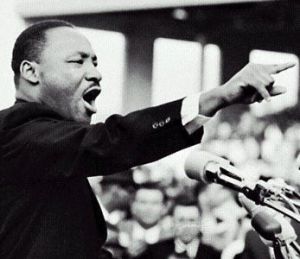
Martin Luther King
Even when pressed by the demands of inner truth, men do not easily assume the task of opposing their government’s policy, especially in time of war. Nor does the human spirit move without great difficulty against all the apathy of conformist thought within one’s own bosom and in the surrounding world. Moreover, when the issues at hand seem as perplexing as they often do in the case of this dreadful conflict, we are always on the verge of being mesmerized by uncertainty. But we must move on.
Some of us who have already begun to break the silence of the night have found that the calling to speak is often a vocation of agony, but we must speak. We must speak with all the humility that is appropriate to our limited vision, but we must speak. And we must rejoice as well, for surely this is the first time in our nation’s history that a significant number of its religious leaders have chosen to move beyond the prophesying of smooth patriotism to the high grounds of a firm dissent based upon the mandates of conscience and the reading of history. Perhaps a new spirit is rising among us. If it is, let us trace its movements, and pray that our own inner being may be sensitive to its guidance, for we are deeply in need of a new way beyond the darkness that seems so close around us.
We are called to speak for the weak, for the voiceless, for the victims of our nation, for those it calls “enemy,” for no document from human hands can make these humans any less our brothers.
Our government felt then that the Vietnamese people were not ready for independence, and we again fell victim to the deadly Western arrogance that has poisoned the international atmosphere for so long.
We have destroyed their two most cherished institutions: the family and the village. We have destroyed their land and their crops.
Surely we must understand their feelings, even if we do not condone their actions. Surely we must see that the men we supported pressed them to their violence. Surely we must see that our own computerized plans of destruction simply dwarf their greatest acts.
Here is the true meaning and value of compassion and nonviolence, when it helps us to see the enemy’s point of view, to hear his questions, to know his assessment of ourselves. For from his view we may indeed see the basic weaknesses of our own condition, and if we are mature, we may learn and grow and profit from the wisdom of the brothers who are called the opposition.
At this point I should make it clear that while I have tried in these last few minutes to give a voice to the voiceless in Vietnam and to understand the arguments of those who are called “enemy,” I am as deeply concerned about our own troops there as anything else. For it occurs to me that what we are submitting them to in Vietnam is not simply the brutalizing process that goes on in any war where armies face each other and seek to destroy. We are adding cynicism to the process of death, for they must know after a short period there that none of the things we claim to be fighting for are really involved. Before long they must know that their government has sent them into a struggle among Vietnamese, and the more sophisticated surely realize that we are on the side of the wealthy, and the secure, while we create a hell for the poor.
Somehow this madness must cease.
Each day the war goes on the hatred increases in the hearts of the Vietnamese and in the hearts of those of humanitarian instinct. The Americans are forcing even their friends into becoming their enemies. It is curious that the Americans, who calculate so carefully on the possibilities of military victory, do not realize that in the process they are incurring deep psychological and political defeat. The image of America will never again be the image of revolution, freedom, and democracy, but the image of violence and militarism.
If we continue, there will be no doubt in my mind and in the mind of the world that we have no honorable intentions in Vietnam. If we do not stop our war against the people of Vietnam immediately, the world will be left with no other alternative than to see this as some horrible, clumsy, and deadly game we have decided to play. The world now demands a maturity of America that we may not be able to achieve. It demands that we admit that we have been wrong from the beginning of our adventure in Vietnam, that we have been detrimental to the life of the Vietnamese people. The situation is one in which we must be ready to turn sharply from our present ways. In order to atone for our sins and errors in Vietnam, we should take the initiative in bringing a halt to this tragic war.
A true revolution of values will soon look uneasily on the glaring contrast of poverty and wealth. With righteous indignation, it will look across the seas and see individual capitalists of the West investing huge sums of money in Asia, Africa, and South America, only to take the profits out with no concern for the social betterment of the countries, and say: “This is not just.” It will look at our alliance with the landed gentry of South America and say: “This is not just.” The Western arrogance of feeling that it has everything to teach others and nothing to learn from them is not just.
A true revolution of values will lay hands on the world order and say of war: “This way of settling differences is not just.” This business of burning human beings with napalm, of filling our nation’s homes with orphans and widows, of injecting poisonous drugs of hate into the veins of peoples normally humane, of sending men home from dark and bloody battlefields physically handicapped and psychologically deranged, cannot be reconciled with wisdom, justice, and love. A nation that continues year after year to spend more money on military defense than on programs of social uplift is approaching spiritual death.
America, the richest and most powerful nation in the world, can well lead the way in this revolution of values. There is nothing except a tragic death wish to prevent us from reordering our priorities, so that the pursuit of peace will take precedence over the pursuit of war. There is nothing to keep us from molding a recalcitrant status quo with bruised hands until we have fashioned it into a brotherhood.
A genuine revolution of values means in the final analysis that our loyalties must become ecumenical rather than sectional. Every nation must now develop an overriding loyalty to mankind as a whole in order to preserve the best in their individual societies.
This call for a worldwide fellowship that lifts neighborly concern beyond one’s tribe, race, class and nation is in reality a call for an all-embracing and unconditional love for all mankind. This oft misunderstood, this oft misinterpreted concept, so readily dismissed by the Nietzsches of the world as a weak and cowardly force, has now become an absolute necessity for the survival of man. When I speak of love I am not speaking of some sentimental and weak response. I’m not speaking of that force which is just emotional bosh. I am speaking of that force which all of the great religions have seen as the supreme unifying principle of life. Love is somehow the key that unlocks the door which leads to ultimate reality. This Hindu-Moslem-Christian-Jewish-Buddhist belief about ultimate reality is beautifully summed up in the first epistle of Saint John: “Let us love one another, for love is God. And every one that loveth is born of God and knoweth God. He that loveth not knoweth not God, for God is love.” “If we love one another, God dwelleth in us and his love is perfected in us.” Let us hope that this spirit will become the order of the day.
We can no longer afford to worship the god of hate or bow before the altar of retaliation. The oceans of history are made turbulent by the ever-rising tides of hate. History is cluttered with the wreckage of nations and individuals that pursued this self-defeating path of hate. As Arnold Toynbee says: “Love is the ultimate force that makes for the saving choice of life and good against the damning choice of death and evil. Therefore the first hope in our inventory must be the hope that love is going to have the last word.”
We are now faced with the fact, my friends, that tomorrow is today. We are confronted with the fierce urgency of now. In this unfolding conundrum of life and history, there is such a thing as being too late. Procrastination is still the thief of time. Life often leaves us standing bare, naked, and dejected with a lost opportunity. The tide in the affairs of men does not remain at flood. It ebbs. We may cry out desperately for time to pause in her passage, but time is adamant to every plea and rushes on. Over the bleached bones and jumbled residues of numerous civilizations are written the pathetic words, “Too late.” There is an invisible book of life that faithfully records our vigilance or our neglect. Omar Khayyam is right: “The moving finger writes, and having writ moves on.”
We still have a choice today: nonviolent coexistence or violent co-annihilation. We must move past indecision to action. We must find new ways to speak for peace in Vietnam and justice throughout the developing world, a world that borders on our doors. If we do not act, we shall surely be dragged down the long, dark, and shameful corridors of time reserved for those who possess power without compassion, might without morality, and strength without sight.
Now let us begin. Now let us rededicate ourselves to the long and bitter, but beautiful, struggle for a new world. This is the calling of the sons of God, and our brothers wait eagerly for our response. Shall we say the odds are too great? Shall we tell them the struggle is too hard? Will our message be that the forces of American life militate against their arrival as full men, and we send our deepest regrets? Or will there be another message of longing, of hope, of solidarity with their yearnings, of commitment to their cause, whatever the cost? The choice is ours, and though we might prefer it otherwise, we must choose in this crucial moment of human history.
Leave a Comment so far
Leave a comment